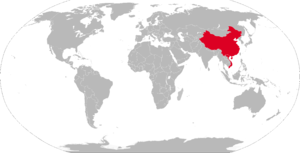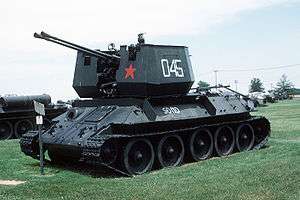Type 63 anti-aircraft gun
| Type 63 | |
|---|---|
|
A Type 63 on display at the US Army Aberdeen Proving Grounds. | |
| Type | Self-propelled anti-aircraft gun |
| Place of origin |
|
| Specifications | |
| Weight | 32 tonnes (35.2 tons) |
| Length | 6.432 m (21 ft 1 in) |
| Width | 2.99 m (9 ft 10 in) |
| Height | 2.99 m (9 ft 10 in) |
| Crew | 6 |
|
| |
| Armor | 18-45 mm (0.7-1.8 in) |
Main armament | twin Type 63 37 mm (1.45 in) anti-aircraft autocannons[1] |
| Engine |
12-cylinder turbocharged diesel 580 hp (432 kW) |
| Power/weight | 18.1 hp/tonne (13.5 kW/tonne) |
| Suspension | Christie |
Operational range | 300 km (190 mi)[1] |
| Speed | Road: 55 km/h (34 mph) |
The Type 63 is a Chinese self-propelled anti-aircraft gun[2][3] based on the Type 58 medium tank (itself a Chinese copy of the Soviet T-34/85).
Description
The Type 63 retains the hull from the Type 58 but the turret was replaced by an open-top box turret armed with twin Type 63 37mm anti-aircraft guns.[1] The guns were loaded manually with 5-round clips. While the Type 63 was on par with contemporary anti-aircraft systems, such as the M42 Duster, due to the lack of hydraulic elevation systems, the guns had to be elevated manually. Because of this, the Type 63 was ineffective against fast moving, low flying aircraft. Nevertheless, due to its rate of fire, it was found to be an effective ground support weapon.
Service history
The Type 63 was supplied to the NVA by China during the Vietnam War. The NVA used it extensively in the Vietnam War but only a small number were available due to the lack of adequate anti-aircraft equipment. It remained in service with the post-war People's Army of Vietnam, as well as the PLA, until the late 1980s. At least one was captured by the Army of the Republic of Vietnam during the 1972 Easter Offensive.[1]
Operators

Former operators
-
 People's Republic of China - Small numbers until the 1980s.
People's Republic of China - Small numbers until the 1980s. -
 North Vietnam - Passed on to unified Vietnam.
North Vietnam - Passed on to unified Vietnam. -
 South Vietnam - A number captured from the Vietnamese People's Army.
South Vietnam - A number captured from the Vietnamese People's Army. -
 Vietnam - Small numbers until the 1980s.
Vietnam - Small numbers until the 1980s.
References
- Hogg, Ian (2000). Twentieth-Century Artillery. Friedman/Fairfax Publishers. ISBN 1-58663-299-X
- Dougherty, Martin J. (2007). The World's Worst Weapons. Amber Books Ltd. ISBN 978-1-905704-36-1
External links
- Type 63 Self-Propelled Anti-Aircraft Gun System from Federation of American Scientists website
